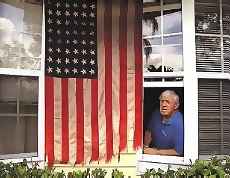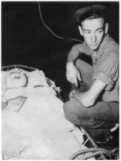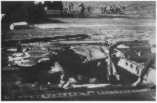"Those sailors will be etched forever in the memory of those of us who came back." --Glenn Noffsinger RDM2c
| Just after noon, a kamikaze swooped out of the clouds and plunged toward Ticonderoga. He crashed through her flight deck and his bomb exploded just above her hangar deck. Several planes nearby erupted into flames. Death and destruction abounded. Wounded denizens of the deep often attract predators. Ticonderoga was no exception. Another plane slipped through and smashed into the starboard side. His bomb set more planes on fire, and injured or killed another 100 sailors. Capt. Kiefer was among those seriously wounded. Yet, Ticonderoga's crew refused to submit. They brought her fires under control not long after 1400; and Ticonderoga retired painfully.
Years later many who survived that tragic day were asked to recall what they remembered. Though it is painful to recall for most, they did their best just as they did on that fateful day so long ago. Below are some of those memories recalled by crew members.
Glenn Noffsinger RDM2c
There are two memories that will remain with me forever. One, after two planes hit us, a medic asked me to stay with a wounded sailor until he expired. The sailor begged me to keep him alive so he could go home to his wife and children. As I held his body together he passed away with his family on his mind until the end. To this day I do not know his name or remember his rank. His last words were, "Don't let me die."
The second memory was being selected at random to serve on the Burial Preparation Detail. We took the remains after preparation to the fantail for burial at sea the next day. With the greatest devotion and with Honors the remains were slipped into the sea to rest there forever. Those families left back home may still be wondering what happened. Believe me, I know. They can now rest in peace as can those sailors who gave their lives in serving their country. Those sailors will be etched forever in the memory of those of us who came back.
We had the greatest skipper the Navy ever had, Dixie Kiefer. When we went to sea he said he would do his best to bring us back and he did his very best job to do just that.
Frank R. Neubauer EM3c
The best I can remember, I was assigned as the electrician mate on one of our two 36" searchlights. During GQ that's where I go. On the day we were hit, it was my turn to go below and get some chow. I remember that we had chicken and I was sitting by the ladder. The next thing I remember is that someone at the top of the ladder shouted, "WE HAVE BEEN HIT!" Then a shipmate came falling down the ladder. I was scared and made my way up to the flight deck, only to see my battle station was where we were hit. Then someone said, "Help me dump the ammo from the planes before they catch fire." We pushed planes over the side. That is the best I can remember.
Edgar Newlin AMM3c
As I remember, it was a nice calm day, which influenced a later decision. I was a plane captain. For anyone that doesn't know what that is. I took care of an airplane, a fighter to be exact. I was suppose to keep it fueled, tied down, cleaned etc. We were suppose to stay with the plane anytime we were at flight quarters if it wasn't tied down.
At this time we were at flight quarters, but for some reason the lunch had been delayed so my plane was just sitting there. I would have been the third plane launched, one on each catapult, and then mine.
It was past noon and we hadn't had chow when another plane captain came along and talked me into going. Remember, we were not suppose to leave our plane in that condition, but we did and it probably saved my life. We had just reached the mess hall when the fantail 40s started firing, maybe three or four rounds. Then they started General Quarters, maybe two or three boings, when a suicide plane hit and blew up on the hangar deck. It sounded like a bucket with rocks in it;more of a rattle than an explosion.
I dropped my tray and started back up the flight deck, but by then smoke was everywhere and some of the hatches had been closed so I had an awful time getting back to my battle station, which was my plane, and when I got there it was gone! Thats was where the jap had hit. He must have aimed for my plane; it went through the flight deck and blew up on the hangar deck. That was what I heard when I was in the mess hall.
I didn't have a battle station so I just wandered around kind of in a daze. I had no idea what to do. I tried to help others, but I seemed to be in the road. I don't know how much later it was, it seemed like hours but was probably not over 30 minutes, when I found myself standing on the flight deck, forward of the five-ince guns, watching a second Jap plane heading straight for the island. I just stood there watching because I was sure he would go down. I could see the tracer shells, going through the plane and the pilot.
It soon became clear that he was going to hit us. About then I realized where I was standing. I looked around;all I could do was jump down to the catwalk and head for the port side under the flight deck. When I was about halfway across I heard the plane hit the island.
From then on I remembered only flashes of what happened. I remember wandering around, trying to find where I was needed but I don't recall doing anything specific. I still feel the hopeless feeling of not being able to do anything for my friends. I don't remember many names - Selbe walking around holding a big wad of cotton on what was left of his arm. blown off just above his elbow. He died about 2:00 the next morning -shock they said. There was a little boy named Menard, blown in half. He always wore his dog tags on his belt loop, so we could identify him from that. I don't think he was much over fifteen at the time.
I remember they used our compartment as part of Sick Bay that night so we slept wherever we could. The next day the hospital ship took the wounded and we had burials at sea all afternoon. I have never had any doubt that I was saved by divine intervention. If I had been where I was supposed to be, I would surely have been killed. If we started two minutes later we would have been caught on the hangar deck where all the casualties of the first plne were. If we had gone sooner we might have been back to my plaane and I would have been killed then.
To this day I do not know who talked me into leaving my plane. I can't even see his face - it seems he was a little heavy but that is all I remember about him. If anyone recognizes himself, please let me know. I would like to thank you.
Dave Kelley
Most were at noon chow below deck when the Japs came out of nowhere and attacked. They had about 98 planes, 6 were used as observation planes, the rest were Kamikazes loaded with explosives ready to dive into any ship of ours. I ran up on our gun battery, holding a 20mm gun magazine ready to load when the 1st Jap kamikaze plane hit us.
It went thru the flight deck and exploded on the hanger deck killing and wounding a lot of guys running to their battle stations. I was lucky I was holding a heavy magazine to load. I got blown up in the air and then down, but the weight of the magazine saved from getting blown overboard.
Now strapped in guns, we were able to start busting ass. We were knocking their planes out pretty good when one more got thru and hit the ship's island where all the officers are running the ship. Capt. Kiefer got 68 separate shrapnel wounds, the executive officer was killed, many others wounded.
We are now listing badly and fires all over the ship, gasoline flowing all over the deck causing more fires, blow up some of the planes on deck. We had to get out because the fires were hitting us. The Marines, who were able, helped the fire control guys push all the remaining planes off the end of the ship before they caught fire. We then help put out the fires, flood ammunition rooms, help wounded.
We got out of there with the help of destroyers firepower. The following week we searched and collected all the dead putting them in mattress sacks, burying them at sea during though next week. It was hell.
I was one of the 1st 100 hit and injured (burns on arms and shoulder, left side and a piece of shrapnel in the stomach, nothing compared to Bob Hoopes (my best man at my wedding), who almost lost his one leg and a lot of other Marines and Sailors.
We lost 6 Marines that day, and many more Sailors. It took one week for us marines to search and find all the dead bodies. It took us a whole week to bury them at sea. We played "Taps" for each one as we dropped each into the ocean. I still fill up heavy when "Taps" are played and I still hear "the sound of the Plunk in my head when each body hit the ocean water. It stays with you.
Larry Meyer MM2c
I was in A Division and on January 21,1945, for some reason or other I was in my bunk so evidently I must have had an earlier watch. A Division, where I slept, was one deck below the hangar deck. When we heard the explosion I jumped out of my bunk and someone in the area said, "They must be firing the five inch guns." I said, "Five inch guns, your ass, we've been hit!" I grabbed all my battle gear and ran to my battle station which was the damage control party in the forward mess hall. When I got there, there were quite a few people there ahead of me. There were several inches of water on the deck and a Chief, I think his name was Taylor, grabbed hold of me and said, "You and Fetters walk to the forward elevator pump room and light off the equipment so the forward elevator can be lowered to the hangar deck." I didn't know at the time but was told later that the fire on the hangar deck had spread to the hangar deck forward elevator pit. I suppose the theory was that if we lowered the elevator down onto the pit it would smother the fire. Anyway, Fetters and myself put on our gas masks and we worked our way forward in the ship, going through officer's country. The smoke was very thick and it was difficult to see. I went through a passageway past probably a dozen or more mess cooks for officer's country, just standing there in their white uniforms - no gas masks or anything, just standing there. I don't know whatever happened to any of them. Finally we got forward and reached the first hatch which led down to the forward elevator pump room. We opened that hatch, worked our way down, secured it behind us, opened the next one and so on until we got through about four hatches, quite a way down into the ship. When we got to the pump room there were already two members of A Division manning the equipment there. I can't remember if they had already lowered the elevator or we told them that they wanted it lowered. I guess we were down there two or three days, however long the fires were raging. I know one of us had to go up once in a while and get some K rations. It wasn't bad down there. I guess the only time I really got scared was when they put a list on the ship. I found out later it was to run the burning gasoline over the side, but down there we didn't know whether the ship was going to capsize or not. Fortunately everything turned out alright for us. None of us were hurt down there but we did lose at least one man from A Division -1 think his name was Mazur. I did have a good friend on the ship, Ollie Breault, a yeoman. He received a Bronze Star for what he did that day on one of the gun mounts. He was on one of the 20 mms. Everybody around him was killed and he took over the gun and kept firing.
Lawrence E. Miles AMM3c
I was a plane captain, AMM3c, V2 Division, assigned to an F6F Hellcat which was fueled and armed on the hangar deck at the time of the attack. Personally, I was with the majority of the division in the mess hall when General Quarters was sounded. I proceeded from the mess hall to the hangar deck and was emerging from the forward hatch of the island exit to the deck as the first plane came through the flight deck and exploded. Due to the fire there were eight to ten men trapped in the island and forced to proceed upward. I was not hit, suffering only slight flash burns; however, the remainder, with the exception of Air Commander Miller, had injuries, some of which were serious and in at least one instance, fatal. Commander Miller and I attended the injured as best we could until Commander Miller exited the compartment in the island to a position on the bridge. Following his exit, the second plane approached from starboard. I watched through the porthole until it crashed just above. As you are probably aware, Commander Miller was killed on the bridge at that time. There were no further injuries to anyone in the compartment where I was trapped and we were subsequently able to reach the flight deck by exiting through the porthole with the aid of lines lowered to our level. Since my discharge I have made several inquiries in Marion, Indiana, which is near my home, as to anyone that had knowledge of Commander Miller's family, without success. In as much as I was one of the last persons to have seen him, I would have liked to express my sympathy to his family. I keep asking and perhaps someday I will locate someone to whom the story of his last minutes can be related.
^ back to top ^ ^ Page 2 ^ ^ Page 3 ^ ^ Page 2 ^ ^ Page 3 ^
|


